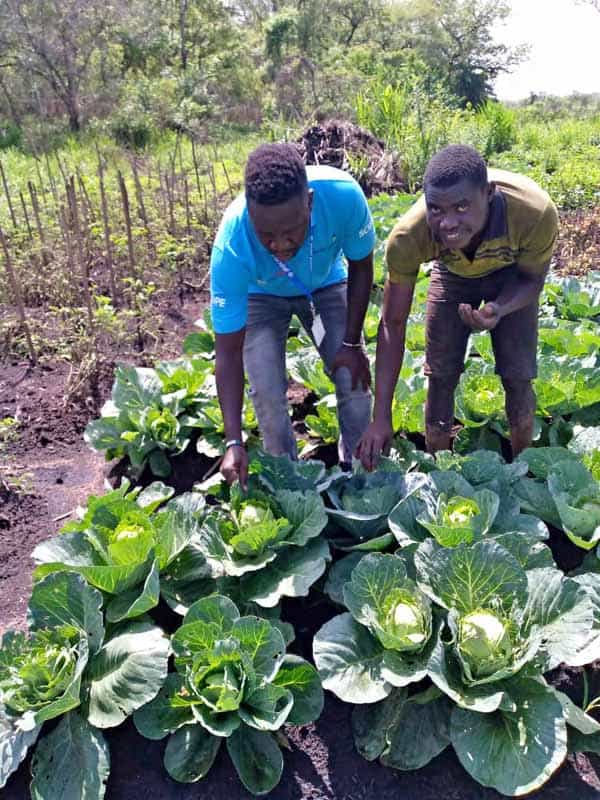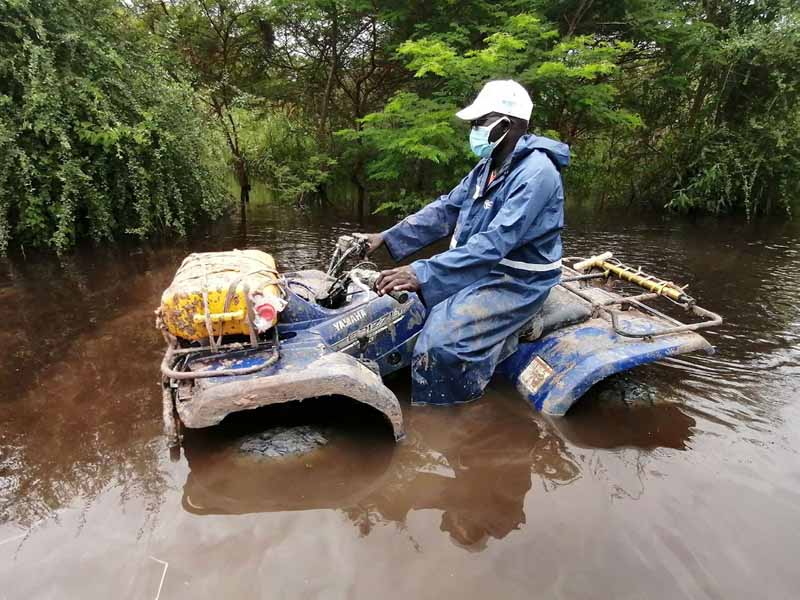Through the Flood: How Conflict and Climate Change are Converging in South Sudan
Serving the most vulnerable often means accessing the furthest, hardest-to-reach places in order to meet those in greatest need. For Daniel Erwaga, it meant riding through waist-deep flood waters on a 4×4 all terrain vehicle to assist farmers whose fields had been flooded in South Sudan.
Over the last three years, record amounts of rainfall have led to increased flooding in South Sudan, affecting more than 835,000 people.
According to the United Nations High Commission for Refugees:
Climate change is driving more frequent and intense weather and climate extremes such as cyclones, floods and droughts, negatively impacting agricultural production, food and water resources, and people’s livelihoods. These effects can lead to conflict and humanitarian disasters and are increasingly contributing to displacement in different regions of the world.
Since gaining independence in 2011, South Sudan has struggled with ongoing civil conflict. This political instability has contributed to a food security crisis that today, is being aggravated all the more by climate instability.
Today, former World Relief staff, Daniel Erwaga, joins us from Juba to talk about how conflict and climate change are converging in South Sudan to increase the vulnerability of those already struggling with food insecurity.
Daniel shares his experience as a professional agriculturalist and South Sudanese citizen. Though the events discussed are occurring in South Sudan, we all have a role to play — as crises converge, the only way to move forward is together.
Read on to learn more and join us.
WR: Hi Daniel. Thanks for being with us today.
Daniel: Thank you. I’m so much pleased to have this interview.
WR: Could you start by telling us about the type of work you did for World Relief South Sudan?
Daniel: I started working with World Relief in 2017 until 2022 in March when my contract ended. I worked on emergency projects in partnership with OFDA and FAO. My role as an agriculturalist was to help people in Fangak and Koch communities understand the value of farming as a vocation. People here are pastoralists. They don’t know much about farming. I teach them everything from how to successfully grow crops all the way to running a business and selling their crops in the market.
WR: What prompted you to pursue a career as an agriculturalist?
Daniel: Of course. I’ve chosen this career based on my mentor – my father. He was also an agriculturalist. Back home, he had a kitchen garden and that kitchen garden impressed me. I told him I wanted to become an agriculturalist the same as him and he said, “No problem. You can do that.”
It is both love and a desire to have knowledge that pushed me to go into agriculture. When I was young, I thought to myself, “Of course, food is being produced by an agriculturalist. Why don’t you go and become a professional farmer because day and night, people are eating?” If I can go into agriculture, I can have a broader understanding of farming to help secure the nation, which is struggling with food insecurity.
WR: Can you share more about why this work is so important for communities in South Sudan?
Daniel: Yes. Currently, more than 8 million people are experiencing hunger in South Sudan. My philosophy is that I am helping them help themselves. Through our efforts, farmers are able to do for themselves because of the training and agronomic practices they learn. Of course, when there is conflict, people can’t cultivate the land, and often they move to another location. This mass migration into other territories can lead to more conflict and food shortages. And then there is the flood issue.

WR: How are you seeing the effects of climate change in the communities where you have worked?
Daniel: Climate change isn’t just in South Sudan, it’s everywhere. When there’s too much rain, it destroys crops from the gardens. I know you guys may not see it in the U.S., but here, we can also see the impact of climate change where animals die day and night because they don’t have anywhere to graze and they don’t have anywhere to stand. That’s part of it, but it also affects crops. You cannot harvest, of course, when your garden is flooded with water.
WR: In your experience, how have you seen conflict and climate change as being connected?
Daniel: Yes. In my own experience, climate change has nothing to do with conflict, but it also has something to do with conflict. Most of the conflict that happens in South Sudan is because of the power struggle. But on the other hand, climate change has contributed to the effects of the conflict.
Let’s take an example like Jonglei State. They’re pastoralists. When the floods came, they moved with their animals to the Equatorial states where the Equatorian people are farmers. When the people from Jonglei come with a large number of herds and cattle, they almost always bring conflict to the new community.
The pastoralists and farmers don’t communicate or collaborate with one another. So, when the pastoralists graze their animal in the farmer’s field, the animal will eat the crops of the farmer, and that’s where the conflict will come in. The flooding, which is caused as a result of climate change, also contributes to the conflict.
WR: There’s a photo of you that has become very popular at Word Relief. Can you tell us what was going on in that picture?
Daniel: You saw me on the convoy? Yes. It was last year in September. Some farmers had been calling me to go and check their gardens [which had been flooded]. I was riding in a truck, but I got stuck. Moving forward was a bit challenging. The place was flooded, so I could not move. I had to stop and assess how shallow the water was because the flood had covered the road, so there was nothing I could do. I could not go back and then I could not go forward.
That’s why I took the initiative of using the quad bike because the car could not access the road. I wanted to see how the garden had been flooded so I could give a report to see how those communities can be helped.

WR: If somebody’s garden is flooded, what kind of help is available to them through World Relief?
Daniel: First, you want to provide basic necessities like offering food because if the garden has been flooded, the person doesn’t expect to yield out of [a flooded garden]. You need to offer help. Then, if the flooding is not so much, you can dig a dyke, which can control the flood from entering into the garden. Those are the things I’ve been helping the farmers to do.
WR: Does South Sudan usually have a rainy season and a dry season, and has that changed?
Daniel: Yes. We have two seasons here, rain season and then dry season. As I’m speaking now, people are complaining because people are sleeping over the water. As a result, there is mass migration. People are moving out to higher elevated ground because of the flood.* Currently, we are now in the rainy season.
WR: What challenges does it create when so many people have to move to a new place because of flooding?
Daniel: There are a lot of challenges, one of which is shelter because when you migrate to a new location, you may find it hard for you to find shelter. Finding a place to sleep is a problem. Also toilets. A lot of disease can come when people don’t have a place to use the toilet. Also, as I said, there is even community conflict as a result of climate change and migration. People from Jonglei State are also migrating to Equatorian states where the flooding is less. They’re coming with their animals, and then the animals are eating another farmer’s crops, so there is conflict when this happens.
WR: At World Relief, we’ve been talking a lot about COVID, conflict and climate change. What do you think the Christian community can do to help with these crises?
Daniel: Christian community can play a big role in addressing crises like COVID-19. First, they can establish psychosocial support structures in the community to help people who are traumatized, who are affected with COVID-19. We can also build on that by procuring face masks and creating awareness.
Now, when it comes to conflict, the Christian community can promote peace and reconciliation and dialogue forums to address the issue of conflict. Christian community can also provide training in peace-making methodology to address the issue of conflict. These are things World Relief does well in engaging church leaders in the process.
The Christian community can respond differently than other individuals or governing bodies because the church leader is listened to and is trusted by members of the community.
WR: What do you want the global community to know about South Sudan?
Daniel: Of course, most of the global community doesn’t know about South Sudan. South Sudan is the world’s newest nation, gaining independence on July 9th of 2011.
Since gaining independence, conflict has renewed in both 2013 and 2016, and the country has suffered severe flooding and drought. Most of the communities are suffering. As I’m speaking, they need much support to build their livelihood and then to recover from the shock of what they’re going through. You can convey our message to the global community so that they know there’s a country, which is so new and these people are suffering. They’re more vulnerable because communities are highly prone to climate-related impacts and a loss of livelihood because of the flooding.
WR: What would you say is your biggest prayer right now for South Sudan?
Daniel: My biggest prayer for South Sudan is for our country’s leadership so that whatever they’re doing, they are first thinking of the people who are suffering. My biggest prayer for the leaders is that they have a heart of forgiving one another because without peace, we cannot do anything. I do pray for that day and night.
WR: Absolutely. We’ll be praying for that too. Similarly, what do you hope for South Sudan?
Daniel: Personally, I hope for the best, a brighter future for South Sudan. In the future, our country is going to be more stabilized and is going to be a peaceful country. Of course, with support from the global community, I know things will improve well. I have hope for a better future for South Sudanese.
In the face of unprecedented challenges, the only way forward is together. Give today and help us reach more people, in more communities, with more resources than we ever dreamed possible.
*South Sudan is home to the Sudd, the world’s largest wetland covering more than 35,000 square miles. While the Sudd is prone to annual flooding, increased rains have affected the length and intensity of the floods. What’s more, the Nile river feeds into the Sudd from Uganda. A prolonged rainy season in Uganda increases the water levels of the Nile, which can lead to more flooding in South Sudan.

Rachel Clair is a Content Manager at World Relief. Alongside an amazing team of marketing colleagues, she manages the curation and creation of written and multi-media content for World Relief’s global platforms. With more than 10 years of experience creating content for churches and non-profits, she is passionate about developing content that challenges both individuals and communities to lean into all of whom God created them to be. She holds a BFA from Stephens College and is currently participating in a spiritual formation cohort through the Transforming Center in Wheaton, IL.

